 |
| KUSP 88.9 fm kusp.org |
|
| Re-Vision Radio's TOWER OF SONG
Program
with your host
The Gypsy Scholar & Bohemian Essayist
a.k.a. "Radio Master of Ceremonies"
This page is designed to provide a conceptual and imagistic background to "Re-Vision Radio." |
| Tower of Song | And twenty-seven angels
From the Great Beyond
They tied me to this table
In the Tower of Song....
And I'm just paying my rent
every day--In the Tower of Song...
(Leonard Cohen) |
|
| Well, Mr. DJ I just wanna hear
Some rhythm and blues music
On the radio
On the radio
On the radio
Uh-uh, all right
Uh-uh, all right....
Turn up your radio and let me hear the song
Turn it up, turn it up, little bit higher, radio
Turn it up, that's enough, so you know it's got soul
Radio, radio turn it up, hum
La, la, la, la...
And the music on the radio, and the music on the radio
Has so much soul, has so much soul
And you listen, in the nightime
While we're still and quiet
And you look out on the water
And the big ships, and the big boats
Came on sailing by, by, by, by
And you felt so good, and I felt so good
Felt so good....
(Van Morrison)
|
 |
| traditional/classical music |
|
|
 |
| + popular music |
|
|
|
 |
| Philosophy |
|
|
 |
| + Re-Vision Radio |
|
|
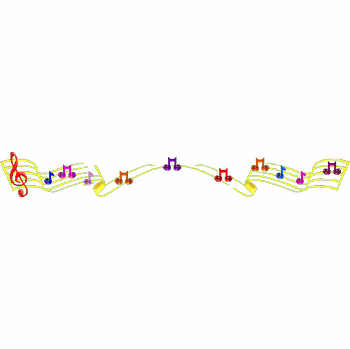 |
| = Musekal PhiloSophy |
|
|
|
|
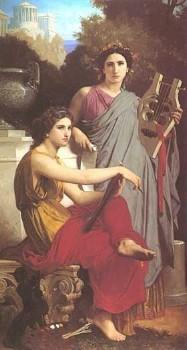 |
| Letters & Music |
|
|
|
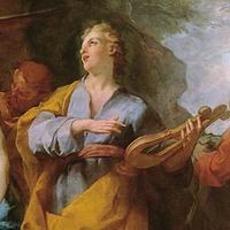 |
| Orpheus |
|
|
 |
| broadcasting Re-Vision Radio's mercurial ideas |
|
|
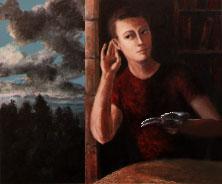 |
| Re-Vision Radio's ideal listener |
|
|
Re-Vision Radio's listeners ask:
What I want to know is
How does the song go?
(Grateful Dead)
And everybody knows that on Re-Vision Radio the song goes perfectly with the essay, because Re-Vision Radio puts its philosophical message across best through song. As the song goes:
That's why I'm telling you in song.
(Van Morrison) |
... You'll be hearing from me baby
Long after I'm gone
I'll be speaking to you sweetly,
From a window--
In the Tower of Song.
(L.C.) |
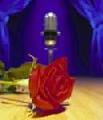 |
| prose + song = "flowers of discourse" |
|
|
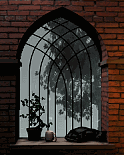 |
| Tower of Song's imaginal window @ 88.9 fm |
|
|
And that "window in the Tower of Song" looks out over that "invisible landscape," or perhaps William Blake's world of Imagination:
"Such the period of many worlds.
Others triangular, right angled course maintain. Others obtruse
Acute, Scalene, in simple paths; others move
In intricate ways, biquadrate, Trapeziums, Rhombs, Rhomboids,
Parallelograms triple & quadruple, polygonic,
In their amazing hard subu'd course in the vast deep." |
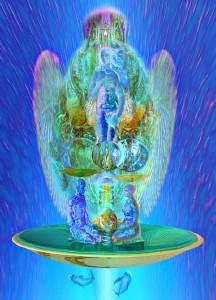 |
| Angel of Entrancement |
|
|
Re-Vision Radio's Philosophy of Re-Enchantment:
Tranceformation--the En-trance to the Tower of Song.
Re-Vision Radio discovers that its unigue radio vocation of uniting, through its Orphic Essay-with-Soundtrack,
scholarly discursive expression with artistic expression was (a)
already in play right at the beginnings of Western dialectics, (b)
fully in play in the Romantic Movement of the nineteenth century (e.g.,
the "Romantic Essay"), and (c) embodied in the Orphic Scholar, Ralph
Waldo Emerson. Therefore, Re-Vision Radio's Tower of Song program is all the more determined to engage in an eccentric style of philosophical rhapsody, or even raving--an eloquent and nuanced raving--, in order to bring out an overall (Neptunean/Mercurial) radio mood, one that comes about through starting off with Socratic argumentation and getting off by moving gradually into Socratic enchantment--musically realized. Thus, Re-Vision Radio goes back--"way, way back"--to the Renaissance concept of "Poetic furor"--"frenzy" or "rapture"--that was believed to manifest in poems and songs.
"Whoever
is possessed in any way by a deity indeed overflows on account of the
vehemence of the divine impulse and the fullness of its power: he
raves, exults ... therefore this possession is called furor .... No one
under the influence of furor is content with simple speech: he bursts
forth into clamoring and songs and poems."
In other words, Re-Vision Radio takes its cue from the Romantic style of communicating knowledge: "to associate ideas in a state of excitement." In addition, Re-Vision Radio's mixing of the two modes of scholarship and art, means that it mixes high and lowRomantic literature. For example, in his "Preface" to Lyrical Ballads, Wordsworth explains that the subject of poetry should be the "Low and rustic life," described culture, which also has its model in
"in a selection of language really used by men; and, at the same time,
to throw over them a certain colouring of imagination, whereby ordinary
things should be presented to the mind in an unusual way . . . as far
as regards the manner in which we associate ideas in a state of
excitement."
Thus, Re-Vision Radio carries on Romanticism's great project of the "re-enchantmant" of the world (after the disenchantment of scientific naturalism), and literally--by way of its dedication to the musician-magician Orpheus and its presentation of Musekal Philosophy--attempts to re-ensing the world (enchant: incantare; incantatare; incantation). In other words, hosting Re-Vision Radio means shamanizing on radio, since it is said that the shaman "sings the world into existence."
Socrates
(of the Phaedrus), the master dialectician, unexpectedly shows us his
Dionysian side. His strict rhetoric gradually flows over into lyrical
eloquence, astonishing his companion. Socrates is soon so possessed by
divine inspiration or madness (of the Nymphs and the Muses) that he
must break off his rapt speech before it threatens put him
entirely out of his senses! The dialogue closes with a hymn to the wild
god Pan. So the mythic Socrates is depicted as a philosophical "enchanter" possessed of enraptured incantation of the poet-musician and offering up hymns to gods of the irrational side of life. [from Essay-with-Soundtrack]
"Like
the perfect hypnotic subject ... [the Orphic Scholar] gives the
impression of being able to enter trance state at the drop of his high
hat, whereupon the liquid measures flow...."
|
|
|
|
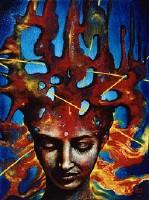 |
| "Tranceformation" |
|
|
There are strange things happening every day
I hear music up above my head
Fill me up with your wonder
Give me my rapture today.
Let me contemplate the presence so divine
Let me sing all day and never get tired
Fill me up from your loving cup
Give me my rapture.
Won't you guide me through the dark night of the soul
That I may better understand your way
Let me be just and worthy to receive
All the blessings of the Lord into my life.
Let me purify my thoughts and words and deeds
That I may be a vehicle for thee
Let me hold to the truth in the darkest hour
Le me sing to the glory of the Lord.
Give me my rapture today.
Repeat...
(Van Morrison, 'Give Me My Rapture Today') | Rave on John Donne, rave on thy Holy fool
Down through the weeks of ages
In the moss borne dark dank pools
Rave on, down through the industrial revolution
Empiricism, atomic and nuclear age
Rave on down through time and space down through the corridors
Rave on words on printed page
Rave on, you left us infinity
And well pressed pages torn to fade
Drive on with wild abandon
Uptempo, frenzied heels
Rave on, Walt Whitman, nose down in wet grass
Rave on fill the senses
On nature's bright green shady path
Rave on Omar Khayyam, Rave on Kahlil Gibran
Oh, what sweet wine we drinketh
The celebration will be held
We will partake the wine and break the Holy bread
Rave on let a man come out of Ireland
Rave on on Mr. Yeats,
Rave on down through the Holy Rosey Cross
Rave on down through theosophy, and the Golden Dawn
Rave on through the writing of "A Vision"
Rave on, Rave on, Rave on, Rave on, Rave on, Rave on
Rave on John Donne, rave on thy Holy fool
Down through the weeks of ages
In the moss borne dark dank pools
Rave on, down though the industrial revolution
Empiricism, atomic and nuclear age
Rave on words on printed page
Rave on, Rave one, Rave on . . .
(Van Morrison, 'Rave On John Donne')
|
Re-Vision Radio's Romantic Synthesis:
Burning the Candle At Both Ends
The
prototypical conception of the primary opposition of the Greek gods
Apollo and Dionysus is one of the outstanding legacies of
nineteenth-century Romanticism (philosophically formulated by
Nietzsche). Simply put, as the theory goes, these two gods represent
contrasting Greek cultural values and their respective psychological
aspects; Apollo representing the civilizing principle, solar
consciousness, masculinity, sublimation of instincts, rationality
itself, and Dionysus representing the other side, that is, nature,
lunar consciousness, femininity, sexuality, intoxication, ecstacy. The
tension between Apollo and Dionysus was thus interpreted, generally, as
the two sides of human nature and, particularly, the psychological
situation of Western, nineteenth-century man, who, being too
over-burdened by Apollonian values, needed to reticfy the cultural
imbalance by turning to the repressed Dionysian side of things
(especially everything that had to do with the "Romantic
Imagination")by eclipsing solar-consciousness with lunar-consciousness--"the nightside of things." (This Romanticism was picked up by Freud and is reflected in his ego vs. id psychological theory.) For the purposes of Re-Vision Radio, Apollo and Dionysus stand for the two archetypal principles of logos and mythos
repectively; the principles, or modes of expression, it wants to
unite--philosophy and music, dialectics/argument and song, rationality
or the critical intellect and intuition/imagination. |
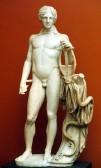 |
| Apollo |
|
|
|
 |
| Dionysus |
|
|
Yeah in the midnight, in the midnight,
I burn the candle
Burn the candle at both ends,
burn the candle at both ends
Burn the candle at both ends,
burn the candle at both ends
And I keep on, `cause I can't sleep at night
Until the daylight comes through
And I just, and I just, have to sing.
Van Morrison
Re-Vision Radio's host, the Gypsy Scholar & Bohemian Essayist--master
of radio ceremonies--, seeking the twilight trance-state of reflection
and reverie, and longing to connect with that soulful dark blue-fire
rhythm of things, romantically
burn the candle at both ends--
logos & mythos, ideas & love, reason & imagination, fact
& fantasy, realism & idealism, dialectical & mystical, mind
& heart--the end of the Argument & Song on your radio dial, tuned to the Romantic Tower of Song. |
Oh my dear, oh my dear sweet love
Oh my dear, oh my dear sweet love
When I'm away from you, when I'm away from you
Well I feel, yeah, well I feel so sad and blue
Well I feel, well I feel so sad and blue
Oh my dear, oh my dear, oh my dear sweet love
When I'm away from you, I just have to sing,
Just Have to sing my hymns
Hymns to the silence, hymns to the silence
Hymns to the silence, hymns to the silence
Oh my dear, oh my dear sweet love
It's a long, long journey
Long, long journey, journey back home
Back home to you, feel you by my side
Long journey, journey, journey
Yeah in the midnight, in the midnight,
I burn the candle
Burn the candle at both ends,
burn the candle at both ends
Burn the candle at both ends,
burn the candle at both ends
And I keep on, `cause I can't sleep at night
Until the daylight comes through
And I just, and I just, have to sing | Sing my hymns to the silence
Hymns to the silence, hymns to the silence
My hymns to the silence
I wanna go out in the countryside
Oh sit by the clear, cool, crystal water
Get my spirit, way back to the feeling
Deep in my soul, I wanna feel
Oh so close to the One, close to the One
Close to the One, close to the One
And that's why, I keep on singing baby
My hymns to the silence, hymns to the silence
Oh my hymns to the silence, hymns to the silence
Oh hymns to the silence, oh hymns to the silence
Oh hymns to the silence, hymns to the silence
Oh my dear, my dear sweet love
Can you feel the silence? can you feel the silence?
Can you feel the silence? can you feel the silence?
(Van Morrison, 'Hymns To the Silence') |
|
Tower of Song
MANIFESTO & VISIONARY RECITAL
"Our High Romantic Argument"
|
RE-VISION RADIO is a Philosophical & Musical program broadcast from an imaginal window at 88.9 on your radio dial from the Tower of Song. Its hosted by the Gypsy Scholar and Bohemian Essayist, with a flower in one hand (or name) and a sword in the other. RE-VISION RADIO is a Soul-making program, because its essentially an underworld perspectivea seeing below surface appearances to the occult or symbolic truth of things. Thus, RE-VISION RADIO is truly Underground Radio.
The experimental format of RE-VISION RADIO is a seamless mixing of argument & song, dialectics & music, or logos & mythos; in other words, philosophical essays are put to music, producing the Orphic Essay-with-Soundtrack. Thus Everybody Knows, since theres a song hermetically hidden in an essay and, conversely, an essay waiting to be revealed in a song, that RE-VISION RADIO puts its philosophy best in songas the lyric goes: Thats why Im telling you in song. In mixing the noetic texts of Philosophy with the poetic texts of Song, RE-VISION RADIO offers its listeners an Orphic soundscape; a medley of the esoteric and the popular, high academic culture and low pop-culturehigh argument & deep songnot from the Ivory Tower, but from that tower down the track: the Tower of Song. Because Everybody Knows that to really grok the meaning of a song context is everything, RE-VISION RADIOs essays contextualize its songs, and, conversely, its songs compose its essay. In the same way, this dialectical relationship between argument & song means that the prose essay contributes gravitas to popular song and, alternatively, popular song gives wings to the essay, composing a Musekal Philosophy. Thus, the fusion of song & argument is the rhyme and reason for the Orphic Essay-with-Soundtrack, which, juxtaposing argument with song, makes for melodious (aesthetic) ideas and discursive notesa kind of Philosophical Concert and, conversely, a kind of Musical Essay. This dialectical inter-textuality creates a novel radio art-form: scholarship as performance art (William Blake's "Mental Studies & Performances"), which is a Romantic way to associate ideas in a state of excitement and to rave on words on printed page. RE-VISION RADIOS musical inter-textuality, because it reads metaphorically between the lines of Philosophy & Song, becomes the imaginal hyper-textuality of a Soul-text. Thus, Everybody Knows that this imaginal kind of Radio-text, haunted by song, is inspired by the legendary Orpheus, master rhetorician and singer of love songs. Questing backway, way backin search of the magical power of music, with the archetype of Orpheus as its guide, RE-VISION RADIO broadcasts a Musekal Philosophy (by way of the ancient Sicilian Muse), which is the perfect union of words and music broadcast through the Essay-with- Soundtrackthe Orphic synthesis of what has been called the Infinite Conversation and the Endless Melody. This perfect union of argument & song is the Romantic ideal of the synthesis of poetry and thought, a union of fact and imagination; not Poetry, but rather a sort of middle thing between Poetry and Oratory. With this Romantic union of poetic furor and reason, the Orphic Essay-with-Soundtrack becomes our high argument, or elevated discourseReason in its most exalted mood. Thus, with the 19th-century Romantic Essay as its model, RE-VISION RADIOs Orphic Essay-with-Soundtrack is a novel revival of the lost Art of the Personal Essay where Soliloquy bridges the gap between high art and popular song. The Orphic Essay-with-Soundtrack is designed to communicate a musical sense of philosophy, one that can be understood as Speculative Music, from one point of view and, from another, Philosophy in a New Key. Thus, Everybody Knows that the Essay-with-Soundtracks musekal philosophy is also a (Romantic) philosophy of music:" a musekal philosophy that issues not in a discursive but in a lyrical knowledge. And, in seamlessly mixing argument & song through Mental Studies & Performances (Blake), Everybody Knows, too, that RE-VISION RADIOs scholarship as performance art makes philosophy sound more musical and, conversely, music sound more philosophical. Thus, in the TOWER OF SONG, philosophical essays aspire to the condition of music; to the condition of music translated into words: The Orphic Essay-with-Soundtrack, which approximates what the Romantics envisionedthe end of philosophy as poetry, or song.
◊
Going back"way, way back"RE-VISION RADIO's Orphic Essay-with-Soundtrack (or the Essay in Argument & Song) would pick up the fallen standard of the nineteenth-century Romantic Essay, which sought to transcend the boundaries of prose and non-prose and conjoin philosophy with poetry. (This is in keeping with the Romantics penchant for mixing genres.) The Romantic Essay has been described (based upon its development by Wordsworth and Coleridge) as a "conjunction of Reason and Passion that did not draw particularly sharp lines of differentiation between poetry and the impassioned, eloquent, and powerful prose." Thus, for Coleridge: The love of truth conjoined with a keen delight in a strict, skillful, yet impassioned argumentation, is my master-passion. Following in this Romantic genre, the Orphic Essay-with-Soundtrack is conceived of as "the perfect union of words and music." Thus, the Orphic Essay-with-Soundtrack, like the Romantic Essay, begins with an "impassioned, eloquent, and powerful prose, following from a fairly strict following of traditional public discourse to modes of prose requiring the virtual abandonment or annihilation of such discourse and often quite literally disappearing into poetry or into the silence of contemplation and vision." The Orphic Essay-with-Soundtrack exists in a liminal radio space, between argument and song, criticism and lyricismfinding the ancient muse where prose and music meet, on the border between prose and poetry. Thus, because the Orphic Essay-with-Soundtrack is about the romance of ideas (eros plus logos; the hearts desire for ecstasy and the heads requirement for clarity), Everybody Knows that RE-VISION RADIO s Musekal Philosophy issues not in a discursive but in a lyrical knowledge.
Because of the sympathetic magic (vibrations of musical tones produced in something as a result of similar vibrations at the same frequency) of playing off the Argument with the Song, the Orphic Essay-with-Soundtracks dialectical relationship of the musicality of the Essay and the philosophy of the Music means that that Argument adds rigor to the Song, while the Song adds lyricism to the Argument. In other words, the music adds the raw energy of Rock to the formal essay and, conversely, the formal essay contributes philosophical meaning to the music. Thus, Everybody Knows the Essay hermeneutically informs the Music, while the Music ecstatically transcends the prose, giving emotional or imaginative heightening to the Essay. RE-VISION RADIO s Orphic Essay-with-Soundtrack attempts to overcome the dichotomy between the prose written word and the lyric that is embodied in song. Given that RE-VISION RADIO posits a dialectical relationship between Argument & Song, this means (when the essay is about the song and visa versa) that the Essay-with-Soundtrack seeks to overcome the dichotomy of the analysis of the song (linernotes) versus its performance. So completely would the Essay-with-Soundtrack mingle Argument & Song that the song speaks the essay, and, conversely, the essay sings the song. In other words, the song becomes the introspective meditation through the philosophical essay and, conversely, the essay becomes the performance of the song through its heightened ideas. Thus, Everybody Knows that music underscores or enhances the essayaestheticizes itand, conversely, the essay conceptualizes and clarifies the song. In the TOWER OF SONG, then, you hear the nuanced gems of lyricism, because popular rock music provides the energy for the Essay-with-Soundtrack, while the essay simultaneously puts the music in hermeneutical perspective. Because its been said that Romantic Mind is "the union of deep feeling and profound thought, RE-VISION RADIO in programming a mix of rigorous intellectual argument and an elevating musical sensuousness, strives to unite reason and imagination, intellect and feeling, head and heart. Thus the Orphic Essay-with-Soundtrack, assaying back and forth between the dialectical and the musical, brings into play a paradoxical reuniting of the head and heart-a Romantic comingling of a "sensuous reason" and a "feeling intellect," thereby synthesizing the left and right brain. So Everybody Knows, "If my heart could do my thinking / And my head begin to feel / I would look upon the world anew / And know what's truly real." [Van Morrison] In practicing its own type of the Romantic Arts & Sciences of the Imagination (Blake), RE-VISION RADIO delights in remixing what the Romantics poetically combined"high Argument" & song (of "the Mind, / My haunt, and the main region of my songWordsworth.) RE-VISION RADIOs Orphic Essay-with-Soundtrack, assaying back and forth between high academic culture (argument) and low pop- culture (song), takes its cue from the great Romantic composer, Beethoven, who, it is said, "took great delight in juxtaposing the exalted and the commonplace," making his music "a union of sensuous and rational." It also looks to the American inspired scholar Emerson who dared to proclaim: "I embrace the common, I explore and sit at the feet of the familiar, the low." Thus, the Musekal Philosophy of the Orphic Essay-with-Soundtrack broadcasts its meaning in two modes: Wordsworths "high argument" and Lorcas "deep song." ". . . they have climbed, / on high with song that is more sweet, more deep." (Dante, Divine Comedy) "Music that can deepest reach." (Emerson, The Essays) And, broadcast on radio, this seamlessness of going back and forth between high argument & deep song is really a gas: "So the words dissolve into the music, and the music dissolves into the words, and a refreshment is produced, kind of oxygen." [Alan Watts] Everybody Knows the Musekal PhiloSophy heard on RE-VISION RADIO means that a Song is as good as an Argument/Essay. In fact, through the Orphic Essay-with-Soundtrack, they are in dialectical relationship; that is, there's a song waiting to be amplified out of an essay and, conversely, there's an essay waiting to be unpacked in a song lyric. Like the Prose-Poem, the Orphic Essay-with-Soundtrack (written with music in mind) has the technical or literary qualities of poetry (such as regular rhythm, definitely patterned structure), but is set on a page as prose. It is a work in prose that has poetic characteristics such as vivid imagery and concentrated expression. Thus, Everybody Knows, the intent of crafting the Orphic Essay-with-Soundtrack (synchronistically inspired by song) is to turn a phrase until it perfectly catches the color of the music. And Everybody Knows that the aim of RE-VISION RADIO, through its Orphic Essay-with-Soundtrack, is to not only to entice the listener to hear the familiar pop-song (empowered by philosophical meaning) anew (and see the essay's meaning amplified by song), but to seamlessly weave together essay & song so that the listener feels like the song was actually tailor-made for the essay. In another sense, the goal of the Orphic Essay-with-Soundtrack is to mix the Argument & Song so seamlessly that listeners won't know if the music exists for the philosophical essay, or the philosophical essay for the music; that is, whether the song simply provides an interlude in the reading of the prose essay, or whether the essay is simply an extended "lead in" to the main purpose of playing the song (i.e., showcasing the song). Therefore RE-VISION RADIO 's Orphic Essay-with-Soundtrack dissolves the boundaries between scholarship and art, criticism and poetry, rhetoric and lyric; between, that is, Argument & Songso much so that it is hoped the listener cant make out where the Argument leaves off and the Song begins, and vice versa. This Orphic magic of entering completely into the song in a meaningful way (musics intellectual value," music giving "insight . . . a flash of understanding," its "the force of mental life, bringing on revelations, music's connection with the inner life of the mind, the personally "associative" quality of music) is the purpose of the Orphic Essay-with-Soundtrack: to find and enter into the TOWER OF SONG.
The Orphic Essay-with-Soundtrack, fusing dialectics and love in flowers of discourse, has Dante as its guide, since the Florentine poet looked back to the Troubadours Dialectic of Love and desired only to write about the Love that discourses in my mind" [Pugatorio]. In the paradise of discourse that is the Orphic Essay-with-Soundtrack, both aspects of the psyche are given their due: reason and imagination, scholarly/critical intellect and intuitive/artistic heart, academic research and mystical insearch; both secular hermeneutics and sacred hermetic/kabbalistic interpretation, both scholarly rigor and poetic reverie, Apollonian clarity and Dionysian obscurity, philosophical questioning and romantic questing. RE-VISION RADIO, then, questingway, way backcarries on, in popular form, the great Platonic synthesis of logos and mythos (i. e., between the earlier mytho-mystical, as it was transmitted through the Greek Mystery Religions, and the newer rationalist development in Philosophy that had broken away from it: "Intellectual rigor [read: "the logical"] and Olympian inspiration [read: "the mytho-poetic"] no longer stood opposed.) Because Platos dialectic becameafter it has risen, with an incredible impulse, through the mania [madness] of Eros to the heights of philosophymantic (poetic-prophetic) vision, RE-VISION RADIOs Orphic Essay- with-Soundtrack would energetically channel Philosophy back through the powerful medium of radio, where it rises to the heights of enraptured songsoul music. Remembering that Philosophy for Plato is a care for soul and begins in wonder," the Orphic Essay-with-Soundtrack spans both logos and mythos: both the critical analysis and the enraptured intuition, both the down-to-earth investigation and the flight of poetic inspiration; the fusion of scholarly rigor with poetic reverie; philosophical aptitude with musical amplitude. Therefore, since it has been said that "Eros redefines reason in its own terms," RE-VISION RADIO's Orphic Essay-with-Soundtrack, mixing PhiloSophy & Song (dialectics & music), replaces the "murders to dissect" (Wordsworth) mode of academic (Protestant) scholarship with service to Eros--insight, synthesis, celebration; "Reason in its most exalted mood," which, in service to Eros, through the Orphic Essay-with-Soundtrack, becomes what Emerson envisioned as a higher reason: "the living, leaping Logos." RE-VISION RADIOs reunion and fusion of Philosophy & MusicMusekal Philosophymakes the ideal philosopher (according to Socrates and Plato) a "fervent musician," or a "musical man. Moreover, because PhiloSophy is a form of playan artistic endeavor, it makes the scholar of philosophy a scholar-artist-musician (an Orphic Scholar), who is distinguished by his or her ability to play with knowledge and create a collage of ideas or intellectual mind-jazz. Thus, RE-VISION RADIOs Orphic Essay-with-Soundtrack is broadcast through what Blake called Mental Studies & Performances. In other words, the Gypsy Scholar attempts to make scholarship a performance art. Therefore, the Musekal PhiloSophy of RE-VISION RADIOs Orphic Essay-with- Soundtrack finally leads not to ponderous academic desiccation, but to ecstatic Dionysian celebrationto the "Joyous Science (of the Troubadours and Emerson and Nietzsche). This means it offers a mood of trance, enchantment, and ecstasy. "All our reasoning ends in surrender to feeling." (Blaise Pascal ) However (listeners be warned), it is not brain-dead, new-age spaciness, but rather, because Mueskal PhiloSophy is both logos and mythos, what the Orphic Scholar, Emerson, knew as "Reason in its most exalted mood," which issues in "music that can deepest reach. And because Everybody Knows that the ability to express complex philosophical ideas in lyrics of song is the gift of Orpheus, RE-VISION RADIO broadcasts what one sixties singer-songwriter said the music of that time promised: "A deep ecstasy that can be had." Therefore, RE-VISION RADIOs Orphic Essay-with-Soundtrack and its Musekal PhiloSophy turn out to be, metaphorically and literally, what one modern philosopher envisioned as "Philosophy In A New Key." [Langer]
◊
The TOWER OF SONG programnot for everyone, but for madmen onlyis underwritten by its ancestral tutelary deities: Hermes-MercuryTrickster-god of those Wednesday communications and connecting synchronicitiesand Sophia-Magdalene, Our Dark Lady of the Romantic Tower of SongGoddess-Muse of Eternal Wisdom & Wit and ancient lonely-tower libraries. RE-VISION RADIO is co-hosted by the Angel of Imagination & Music, along with its twenty-seven angels from the great beyond in hyperspace, where Ushahina, angel of the hours between midnight and the dawn, gets you on her wavelength.
The purpose of the RE-VISION RADIO program is to help guide its listeners--"in the middle of the night"--in searching for, by following the song, and entering into that long-abandoned Romantic Lonely Tower, situated in that alternative mental dimensionthe invisible landscape. Oh let my Lamp at midnight hour / Be seen in some high Lonely Towr, / Where I may oft out-watch the Bear, / With thrice great Hermes. [Milton] Because RE-VISION RADIO is broadcast from this ancient Tower of the Visionary Company, where the poetic champions compose, in the midnight hour those funny voices whisper: You can call my love Sophia, / I call my love Philosophy. And, since the beginning of real Philosophy is the sense of wonder, Everybody Knows that the sense of wonder with radio is all in the mind's eyeradio as Theater of the Imagination, making RE-VISION RADIO the alternative radio concept that lets you see what it means. And what it means, by way of the Romantic Arts & Sciences of Imagination, is that Golgonoozan artifice of eternity The TOWER OF SONG.
◊ ◊ ◊
The love of truth conjoined with a keen delight in a strict, skillful, yet impassioned argumentation, is my master-passion.
(Samuel Taylor Coleridge)
Let us bring to bear the persuasive powers of sweet-tongued Rhetoric and . . . let us have as well Music, the maid-servant of my house, to sing us melodies of varying mood.
(Boethius, The Consolation of Philosophy)
Behind the lyric and the song is the governing, central idea, and you have to keep both of them going, so neither gets bogged down. The trick is to keep them going together.
(Stephen Soundheim)
Whoever is possessed in any way by a deity indeed overflows on account of the vehemence of the divine impulse and the fullness of its power: he raves, exults . . . therefore this possession is called furor .... No one under the influence of furor is content with simple speech: he bursts forth into clamoring and songs and poems.
(Ralph Waldo Emerson)
A revealing glimpse of Mr. Farlow both as a person and a musician
. As much concerned with a philosophy of life as it is with music.
(Talmage Farlow, film by Lorenzo DeStephano, 2006)
After playing Chopin, I feel as if I had been weeping over sins that I had never committed, and mourning over tragedies that were not my own. Music always seems to me to produce that effect. It creates for one a past of which one has been ignorant, and fills one with a sense of sorrows that have been hidden from ones tears. I can fancy a man who had led perfectly commonplace life, hearing by chance some curious piece of music, and suddenly discovering that his soul, without his being conscious of it, had passed through terrible experiences, and unknown fearful joys, or wild romantic loves, or great renunciations.
(Oscar Wild, 'The Critic As Artist')
|
Re-Vision Radio's Gypsy Scholar & Bohemian Essayist ("Radio Master of Ceremonies") broadcasts in exile (in his capacity of "Minister of Information & Culture" for the Visionary Company") from the
TOWER OF SONG |
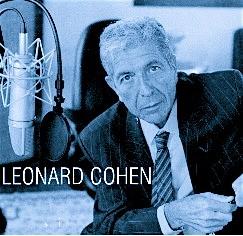 |
| The Tower of Song's poet-visionary in-residence |
|
|
And twenty-seven angels
From the Great Beyond
They tied me to this table right here
In the Tower of Song . . .
And I'm paying my rent every day
Oh, in the Tower of Song |
| Re-Vision Radio, discovering its true voice and vocation in the American Romantic-Orphic tradition, would sing "The Bohemian Hymn," a la Emerson, and thus emplay a Bohemian mode of scholarship as an artistic endeavor. In other words, Re-Vision Radios modern-day Romantic Gypsy Scholar is distinguished by his ability to play with knowledge and create a collage of ideas or an intellectual chamber music of mind-jazz ensembles--a "work of ecstasy" that celebrates, Dionysian style, with "music or dancing." This means that Re-Vision Radio's scholar-artist--an "Inspired Scholar"--doesnt put scholarship in service to Thanatos
(death) that (as Wordsworth complained) "murders to dissect"
(reductionism and literalism), but instead puts it in the service of Eros (life and love), which synthesizes and celebrates in the form of a Musekal Philosophy-- in the TOWER OF SONG. |
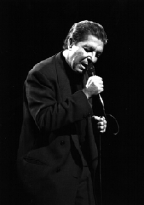 |
| Leonard Cohen, The Prof. of Song |
|
|
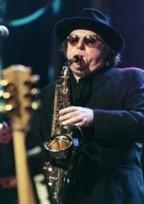 |
| Van Morrison, Bard of Celtic Soul |
|
|
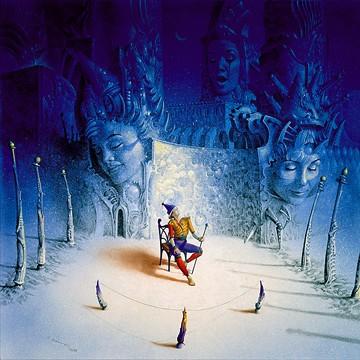 |
| "Song" |
|
|
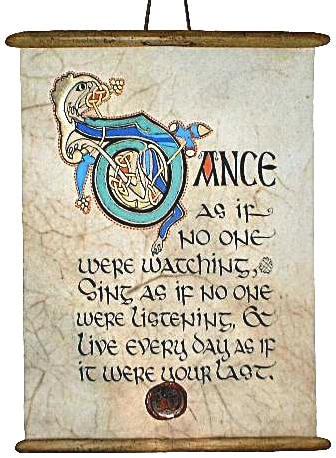 |
| Dance! |
|
|
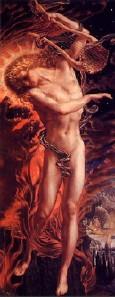 |
| Orpheus In Underworld |
|
|
Why the "GYPSY SCHOLAR":
A Note To Listeners from a Lyrical Scholar Working With Music |
In response to questions from a number of listeners who have wondered why I call myself the Gypsy Scholar & Bohemian Essayist, I offer the following as an explanation of not only the radio handle, but a little about the madness in my method of scholarship as presented in my Orphic Essay-with-Soundtrack.
I have chosen the epithet of Gypsy Scholar because Im a grad-student who has fallen outside the conventional academic role. (An autobiographical account of how this came to be was presented in my radio essay, Musekal Philosophy, early in 2005.) Suffice to say here that it all has to do with discovering the Romantic poets, writers, and philosophers as a mere freshman in college. Thus, the epithet is taken from a Romantic poem by Matthew Arnold, entitled The Scholar Gypsy. [See below.] The added "Bohemian Essayist" epithet comes from the fact that I discovered that the Romantic poets were the spiritual ancestors of the "Beat" poets, who themselves were the early founders of the "counter-culture" of the Sixties. Thus, the radio handle of "Gypsy Scholar & Bohemian Essayist" represents my Beat-oriented rejection of the academic establishment and of its high cutlure: "Rouze Up, Oh Young People of the New Age! Set your foreheads against the ignorant Hirelings ! For we have Hirelings in the Camp, the Court, & the University, who would, if they could, forever depress Mental & prolong Corporeal War" (William Blake). It represents, more precisely, my own attempt to bring togather the best in learned, high cutlure and popular culture, but not through the Ivory Tower, but "that tower down the track." ('The Tower of Song'): As the Orphic scholar, Emerson, put it: I embrace the common, I explore and sit at the feet of the familiar, the low. Therefore, the "Gypsy Scholar" stands for the affirmation of my "amateur" status (the "love" of it). The other reason for Gypsy Scholar is that I understand myself (because of the underground nature of the radio program, and because of the political reality in America today) to be broadcasting in exilefeeling myself to be an alien in my own countryfrom the Lonely Tower of Song.
Accident and coincidence play as prominent a role in directing and shaping ones intellectual work as do research skills and discernment, perhaps a larger role. (?)
I guess you could say that my vocation as a radio essayist actually began my freshman year in college. It was in the wake of the 1960s, and I especially enjoyed the wrtings of the new generation of socio-literary critics, who would use epigraphs not form elite poetry but from popular rock lyrics (like those of Dylan). After a while, my appetitie for the mixing of the popular and the academic demanded more; not just popular folk-rock or rock lyrics prefacing a learned tome, but bursting out all over the prose-text in a non-linear fashion. My own process of writing college papers reflected this imagined phantasmagorical style. I would listen to the popular music of the time while writing. Sometimes these curious synchronistic moments would happen, wherein what I was writing about would be echoed in a song over the radio. As I became more atuned to these fanatasic synchronicities, their rate seemed to increase. This caused me to concentrate more on the art of writing, and soon I was thinking about the rhythms of the great prose works we were assigned in my English Lit. courses. I found myself wondering about a way to match these prose rhythms with music; i.e., to literally hear these underlying rhythms of syntax by exteriorizing them with music. Alas, these crazy notions didn't get very far. This was, after all, the academy, and students weren't expected to take these kinds of liberties with their papers. Indeed, even though some of my academic mentors were breaking out of the strict form of the dissertation--blending prose and poetry, or writing in aphoristic style--none of them dared to get this funky. Thus, my novel idea of the scholar-as-artist was shelved in the library of my mind until I graduated. Years after, I found myself doing radio, and with the advent of the computer hyper-text, new life was breathed into my scholarly fantasy. I thought, "Why couldn't a new scholarly form of the dissertation be multi-dimensional--text, images, and music? Yet, it wasn't until recently, when radio stations integrated their broadcasts with the internet, that this fantasy could be realized. Thus, I became the "Gypsy Scholar & Bohemian Essayist" (not in the Ivory Tower, but in the Musekal Library in the Tower of Song).
The form that my scholarly fantasy took was what I called the "Orphic Essay-with-Soundtrack." However, I wasn't content to push the boundaries of academic form by simply inserting popular song lyrics into the essay as epigraph. I would follow the Orphic muse and let the lyric lusters of snatches from song break out between the lines of prose--all over the page. Thus, the Orphic Essay-with-Soundtrack is thoroughly song-haunted--memorable song lyrics fading in and fading out between the written lines, generating a steady stream of correspondences between the ideas and the music. In reading between the lines of dialectics and song, moving back and forth between the prose and musical text, the Soul-text of the Orphic Essay-with-Soundtrack relocates the listener in the middle of an ancient philosophical Quest-Romance.
... What's madness but nobility of soul
At odds with circumstance? The day's on fire!
I know the purity of pure despair,
My shadow pinned against a sweating wall.
That place among the rocks--is it a cave,
Or a winding path? The edge is what I have.
A steady storm of correspondences!
A night flowing with birds, a ragged moon,
And in broad day the midnight come again!
A man goes far to find out what he is--
Death of the self in a long, tearless night,
All natural shapes blazing unnatural light....
(Theodore Roethke)
Interestingly enough, I had a curious confirmation of my choice for a radio-scholar name when the famous NPR radio scholar, Maureen Corrigan, came to town last September to promote her book, Leave Me Alone Im Reading: Finding and Losing Myself in Books. It certainly sounded intriguing (being that my program comes out of my passion for books and a magical library), and even more so when I read the announcement over the air that she would actually be making an appearance in the KUSP studios for a discussion. I was taken by Ms. Corrigan and got her book, which I asked her to autograph. I told her what I did on radio. But little did I know what was in store for me until I opened the book and scanned through it. This is what I discovered on page 97:
Even when I finally was awarded my Ph.D at thirty-two, I hadnt yet held down what my parents considered a real job. For years before and after I officially became Dr. Corrigan, I was what they call in the profession a gypsy scholarone of a multitude of excess eggheads who roam from campus to campus, teaching introductory courses like Composition. I became practiced at moving into temporary teaching positions and other peoples offices.
This was all new to me, and I couldnt help feeling that my choice for a radio handle was inspired (since I had been doing radio at KUSP for months before the book came out).
Therefore, although I have not yet earned my Ph.D., I consider myself the holder of another office (a higher office): a Prof. of Songway up here . . . in the Tower of Song.
My ideal for what I do on radio (the Orphic Scholar) is embodied in one figureOrpheus. The legendary Orpheus was (other than the founder of the mystery school named after him) a bard, a prophet, a rhetorician, and a musician ("a singer of love-songs). As is well known, Orpheus music could perform magic, making inanimate objects come to life and dance. The ancient writers refer to something called The song of Orpheus. And some modern scholars write of The Orphic Voice: the Speech of the Soul. My vision is of a new kind of scholar, the Orphic Scholar, who wishes to write anecdotes of intellect from that unknown country in which all the rivers of our knowledge have their fountains. (Emerson). So let me try to convey the heart and soul of my inspiration from that imaginal place (where Im paying my rent everyday), which is located in that invisible landscape, or unknown country.
"You see him spend his Soul in Prophecy. / Do you believe it a confound lie / Till some Bookseller & the Public Fame / Proves there is truth in his extravagant claim." William Blake
"The works that take you there have just one meaning. / Thrown into a burning bush with a crackling sound. / What you learn in silence. / What you win through screaming. / What you have is nothing there till you lay it down... " Bob Franke, song Holy Ground
Reclaiming the amateur status of a Bohemian Essayist, I do not pretend any pure originality. I freely admit to being influenced by the creative ideas and visions of my favorite writers. But I have to qualify this by also admitting that I make them my own not because they are something totally new or alien to my mind, but because they are immediately recognized as something I've also known but not articulatedsomething I've already intuited. Because I've lived with and gotten to know these ideas and visions for so long, its practically impossible to separate "my own" thoughts from "their" thoughts and, therefore, I only claim to contribute to the already circulating intellectual and visionary data the novel imprint of my own interests, passions, and insights on the pre-existing work of others.
"In the lonely, dead of midnight
In the dimness, of the twilight
By the streetlight, by the lamplight . . .
In the sunlight, in the daylight
And I'm workin', on the insight . . ."
(Van Morrison)
My only claim to so-called "originality" could be in organizing the material of others in my own novel way; organizing it so that syncretic connexions are made between ideas that have not been, as far as I am aware, heretofore generally recognized (although the information and the clues for a syncretic re-visioning have been laying around for some time). Because I rely so much on the energy of the speculative imagination of the poet, I agree with the image of the scholar-as-artist:
"My way of working is one of letting the mind play freely around a subject where there has been much endeavor but little attempt at perspective."
I enjoy a mode of scholarship as artistic endeavor, where the modern-day "Gypsy Scholar" is distinguished by the ability to "play with knowledge" and create a collage of ideas. My method is largely intuitive (the intuitive imagination of the poet); that is, generally speaking, intuitions and insights come first about a subject, and then I go to the "experts" to substantiate them, as with the following find: "To the rationally minded the mental processes of the intuitive appear to work backward. His conclusions are reached before his premises". And my purpose in citing the experts is to bring to bear as much scholarly evidence as I can for my intuitions. In other words, bring the weight of recognized scholarship to support my independent ideas/insightsmy "extravagant claim.
It should be pointed out that my Orphic Essay-with-Soundtrack falls between the cracks of conventional, academic composition, locating itself in the genre of the Romantic Essay (which demonstrated the Romantic's penchant for the mixing of genres); the "conjunction of Reason and Passion that didn't draw sharp lines of differentiation between poetry and the impassioned, eloquent, and powerful prose". Thus, my Orphic Essay-with-Soundtrack, begins
"from a fairly strict following of traditional 'public' discourse to modes of prose requiring the virtual abandonment or annihilation of such discourse and often quite literally disappearing into poetry or into the silence of contemplation and vision.
And therefore, my Orphic Essay-with-Soundtrack seeks, through the magic of the coming together of the spoken word and musicof argument intermixed with song, to conjure up a mood, which is, at the same time, a thinking mood; a new mood of thoughtReason in its most exalted moodthe thought of the heart in its higher, visionary mode. So, in creating a kind of Orphic medley of knowing and loving, I'm affirming the return of eros to scholarship (from Plato) and, thus, asserting the intimate connection between knowing and desire, between love and ideas; when we love we want to know, we love to knowknowing and desiring are two sides of a single creative moment. This means that the kind of scholarship I practice is not in service to what the Romantic poet, Wordsworth, called murders to dissect (to the principle of analytical reductionism), but rather in service to the principle of eros, which unifies and celebrates--a "work of ecstasy" that celebrates, Dionysian style, with "music or dancing." This means that the "Gypsy Scholar" is a scholar-artist--an "Inspired Scholar." This union of philosophy and love (eros) looks back to Plato and Socrates (The Symposium), and means that in the Tower of Song you cant tell whether the philosophers are singing of loves ecstasies, or whether the lovers are reciting philosophys arguments.
However, it would be a misunderstanding to think that Im taking a new-age position in rejecting (or devaluing) critical thinking and its methods; no, I want to combine both analysis and synthesis. My ideal of scholarship is, surprisingly, very ancient, and goes backway, way, backto Platos philosophy, in which: "Intellectual rigor [read: logic] and Olympian inspiration [read: mythopoetic] no longer stood opposed. After Platos synthesis of logos and mythos, it was the nineteenth-century Romantics who took up the abandoned project of reuniting philosophy with poetry, or reason and imaginationattempting to heal the wound between head and heart. Thus, my Orphic Essay-with-Soundtrack takes its cue from 19th-century Romantic Essay, in that it engages the reader in a discursive process, and moves in a pattern from discursive argument to poetry, being a text of self-discovery. In bringing together Argument & Song, my Orphic Essay-with-Soundtrack aims at a union of fact and imagination, which refuses to separate imagination and intellect, inner experience and the world, and strives toward that moment in which poetry, philosophy, and criticism begin to coalesce. In this coalescence of Philosophy and Music, poetic enthusiasm is no enemy to scholarly discipline.
The way my Orphic Essay-with-Soundtrack works rhetorically is by utilizing both reason and imagination; both scholarly rigor and poetical reverie, both the critical analysis and the enraptured intuition, both the down-to-earth investigation and the flight of poetic inspiration, both the critical/scholarly intellect and intuitive/artistic heart, both secular hermeneutics and sacred hermetic/kabbalistic interpretation, both academic research and mystical insearch, both philosophical questioning and romantic questing, both Apollonian discipline and Dionysian abandon; both the sword of cutting discourse & the rose of healing music, both philosophical aptitude with musical amplitudeso that the Orphic Essay-with-Soundtrack finally leads not to ponderous academic desiccation but to ecstatic Dionysian celebrationa sort of mind-jazz ensemble. Therefore my Orphic Essay-with-Soundtracks hybrid flowers of discourse dissolve the boundaries between scholarship and art, dialectics and poetry, rhetoric and lyric; between, that is, Argument & Songso much so that it is hoped the listener cant make out where the argument leaves off and the song begins, and vice versa. Language is a rose, and the future is still a rose, opening. . . . (Carole Maso)
Therefore, having come this far in my vocation as a Gypsy Scholar & Bohemian Essayist, I can only give this farewell to my academic fathers:
"Ah ye old ghosts! ye builders of dungeons in the air! why do I ever allow you to encroach on me a moment; a moment to win me to your hapless company? In every week there is some hour when I read my commission in every cipher of nature, and I know that I was made for another office, a professor of the Joyous Science, a detector & delineator of occult harmonies & unpublished beauties, a herald of civility, nobility, learning, & wisdom; an affirmer of the One Law, yet as one who should affirm it in music or dancing, a priest of the Soul yet one who would better love to celebrate it through the beauty of health & [the] harmonious power [of music]. (Ralph Waldo Emerson)
In the Orphic Essay-with-Soundtracks wild embrace of both mind and heart, the eye of soul opens, and a soul-text gives voice to the full-bloomed gnosis of love and the love of gnosis. "A lady asks me/ I speak in season/ She seeks reason for an effect, wild often/That is so proud he hath Love for a name." (Ezra Pound) In presenting the fruits of my intellectual work, through scholarship as performance art (Blake's Mental Studies & Performances), I look back to a mentor (the poet-prophet of Imagination), who addressed his readers in the following way:
"The Author hopes no Reader will think presumptuousness or arrogance when he is reminded that the Ancients entrusted their love to their Writing, to the full as Enthusiastically as I have . . . for they were wholly absorb'd in their Gods. . . . Therefore, dear Reader, forgive what you do not approve, & love me for this energetic exertion of my talent." --William Blake
|
The Scholar Gypsy
by
Matthew Arnold
1855
|
Go, for they call you, shepherd, from the hill;
Go, shepherd, and untie the wattled cotes!
No longer leave thy wistful flock unfed,
Nor let thy bawling fellows rack their throats,
Nor the cropped herbage shoot another head.
But when the fields are still,
And the tired men and dogs all gone to rest,
And only the white sheep are sometimes seen
Cross and recross the strips of moon-blanched green,
Come, shepherd, and again begin the quest!
Here, where the reaper was at work of late -
In this high field's dark corner, where he leaves
His coat, his basket, and his earthen cruse,
And in the sun all morning binds the sheaves,
Then here, at noon, comes back his stores to use -
Here will I sit and wait,
While to my ear from uplands far away
The bleating of the folded flocks is borne,
With distant cries of reapers in the corn -
All the live murmur of a summer's day.
Screened is this nook o'er the high, half-reaped field,
And here till sundown, shepherd! will I be.
Through the thick corn the scarlet poppies peep,
And round green roots and yellowing stalks I see
Pale pink convolvulus in tendrils creep;
And air-swept lindens yield
Their scent, and rustle down their perfumed showers
Of bloom on the bent grass where I am laid,
And bower me from the August sun with shade;
And the eye travels down to Oxford's towers.
And near me on the grass lies Glanvil's book -
Come, let me read the oft-read tale again!
The story of the Oxford scholar poor,
Of pregnant parts and quick inventive brain,
Who, tired of knocking at preferment's door,
One summer-morn forsook
His friends, and went to learn the gypsy-lore,
And roamed the world with that wild brotherhood,
And came, as most men deemed, to little good,
But came to Oxford and his friends no more.
But once, years after, in the country lanes,
Two scholars, whom at college erst he knew,
Met him, and of his way of life enquired;
Whereat he answered, that the gypsy-crew,
His mates, had arts to rule as they desired
The workings of men's brains,
And they can bind them to what thoughts they will.
"And I," he said, "the secret of their art,
When fully learned, will to the world impart;
But it needs heaven-sent moments for this skill."
This said, he left them, and returned no more. -
But rumours hung about the countryside,
That the lost Scholar long was seen to stray,
Seen by rare glimpses, pensive and tongue-tied,
In hat of antique shape, and cloak of grey,
The same the gypsies wore.
Shepherds had met him on the Hurst in spring;
At some lone alehouse in the Berkshire moors,
On the warm ingle-bench, the smock-frocked boors
Had found him seated at their entering,
But, 'mid their drink and clatter, he would fly.
And I myself seem half to know thy looks,
And put the shepherds, wanderer! on thy trace;
And boys who in lone wheatfields scare the rooks
I ask if thou hast passed their quiet place;
Or in my boat I lie
Moored to the cool bank in the summer-heats,
'Mid wide grass meadows which the sunshine fills,
And watch the warm, green-muffled Cumner hills,
And wonder if thou haunt'st their shy retreats.
For most, I know, thou lov'st retired ground!
Thee at the ferry Oxford riders blithe,
Returning home on summer-nights, have met
Crossing the stripling Thames at Bablock-hithe,
Trailing in the cool stream thy fingers wet,
As the punt's rope chops round;
And leaning backward in a pensive dream,
And fostering in thy lap a heap of flowers
Plucked in the shy fields and distant Wychwood bowers,
And thine eyes resting on the moonlit stream.
And then they land, and thou art seen no more! -
Maidens, who from the distant hamlets come
To dance around the Fyfield elm in May,
Oft through the darkening fields have seen thee roam,
Or cross a stile into the public way.
Oft thou hast given them store
Of flowers -the frail-leafed white anemony,
Dark bluebells drenched with dews of summer eves,
And purple orchises with spotted leaves -
But none hath words she can report of thee.
And, above Godstow Bridge, when hay-time's here
In June, and many a scythe in sunshine flames,
Men who through those wide fields of breezy grass
Where black-winged swallows haunt the glittering Thames,
To bathe in the abandoned lasher pass,
Have often passed thee near
Sitting upon the river bank o'ergrown;
Marked thine outlandish garb, thy figure spare,
Thy dark vague eyes, and soft abstracted air -
But, when they came from bathing, thou wast gone!
At some lone homestead in the Cumner hills,
Where at her open door the housewife darns,
Thou hast been seen, or hanging on a gate
To watch the threshers in the mossy barns.
Children, who early range these slopes and late
For cresses from the rills,
Have known thee eyeing, all an April-day,
The springing pastures and the feeding kine;
And marked thee, when the stars come out and shine,
Through the long dewy grass move slow away.
In autumn, on the skirts of Bagley Wood -
Where most the gypsies by the turf-edged way
Pitch their smoked tents, and every bush you see
With scarlet patches tagged and shreds of grey,
Above the forest-ground called Thessaly -
The blackbird, picking food,
Sees thee, nor stops his meal, nor fears at all;
So often has he known thee past him stray,
Rapt, twirling in thy hand a withered spray,
And waiting for the spark from heaven to fall.
| And once, in winter, on the causeway chill
Where home through flooded fields foot-travellers go,
Have I not passed thee on the wooden bridge,
Wrapped in thy cloak and battling with the snow,
Thy face tow'rd Hinksey and its wintry ridge?
And thou hast climbed the hill,
And gained the white brow of the Cumner range;
Turned once to watch, while thick the snowflakes fall,
The line of festal light in Christ-Church hall -
Then sought thy straw in some sequestered grange.
But what -I dream! Two hundred years are flown
Since first thy story ran through Oxford halls,
And the grave Glanvil did the tale inscribe
That thou wert wandered from the studious walls
To learn strange arts, and join a gypsy-tribe;
And thou from earth art gone
Long since, and in some quiet churchyard laid -
Some country-nook, where o'er thy unknown grave
Tall grasses and white flowering nettles wave,
Under a dark, red-fruited yew-tree's shade.
- No, no, thou hast not felt the lapse of hours!
For what wears out the life of mortal men?
'Tis that from change to change their being rolls;
'Tis that repeated shocks, again, again,
Exhaust the energy of strongest souls
And numb the elastic powers.
Till having used our nerves with bliss and teen,
And tired upon a thousand schemes our wit,
To the just-pausing Genius we remit
Our worn-out life, and are -what we have been.
Thou hast not lived, why shouldst thou perish, so?
Thou hadst one aim, one business, one desire;
Else wert thou long since numbered with the dead!
Else hadst thou spent, like other men, thy fire!
The generations of thy peers are fled,
And we ourselves shall go;
But thou possessest an immortal lot,
And we imagine thee exempt from age
And living as thou liv'st on Glanvil's page,
Because thou hadst -what we, alas! have not.
For early didst thou leave the world, with powers
Fresh, undiverted to the world without,
Firm to their mark, not spent on other things;
Free from the sick fatigue, the languid doubt,
Which much to have tried, in much been baffled, brings.
O life unlike to ours!
Who fluctuate idly without term or scope,
Of whom each strives, nor knows for what he strives,
And each half lives a hundred different lives;
Who wait like thee, but not, like thee, in hope.
Thou waitest for the spark from heaven! and we,
Light half-believers of our casual creeds,
Who never deeply felt, nor clearly willed,
Whose insight never has borne fruit in deeds,
Whose vague resolves never have been fulfilled;
For whom each year we see
Breeds new beginnings, disappointments new;
Who hesitate and falter life away,
And lose tomorrow the ground won today -
Ah! do not we, wanderer! await it too?
Yes, we await it! -but it still delays,
And then we suffer! and amongst us one,
Who most has suffered, takes dejectedly
His seat upon the intellectual throne;
And all his store of sad experience he
Lays bare of wretched days;
Tells us his misery's birth and growth and signs,
And how the dying spark of hope was fed,
And how the breast was soothed, and how the head,
And all his hourly varied anodynes.
This for our wisest! and we others pine,
And wish the long unhappy dream would end,
And waive all claim to bliss, and try to bear;
With close-lipped patience for our only friend,
Sad patience, too near neighbour to despair -
But none has hope like thine!
Thou through the fields and through the woods dost stray,
Roaming the countryside, a truant boy,
Nursing thy project in unclouded joy,
And every doubt long blown by time away.
O born in days when wits were fresh and clear,
And life ran gaily as the sparkling Thames;
Before this strange disease of modern life,
With its sick hurry, its divided aims,
Its heads o'ertaxed, its palsied hearts, was rife -
Fly hence, our contact fear!
Still fly, plunge deeper in the bowering wood!
Averse, as Dido did with gesture stern
From her false friend's approach in Hades turn,
Wave us away, and keep thy solitude!
Still nursing the unconquerable hope,
Still clutching the inviolable shade,
With a free, onward impulse brushing through,
By night, the silvered branches of the glade -
Far on the forest-skirts, where none pursue,
On some mild pastoral slope
Emerge, and resting on the moonlit pales
Freshen thy flowers as in former years
With dew, or listen with enchanted ears,
From the dark dingles, to the nightingales!
But fly our paths, our feverish contact fly!
For strong the infection of out mental strife,
Which, though it gives no bliss, yet spoils for rest;
And we should win thee from thy own fair life,
Like us distracted, and like us unblest.
Soon, soon thy cheer would die,
Thy hopes grow timorous, and unfixed thy powers,
Adn thy clear aims be cross and shifting made;
And then thy glad perennial youth would fade,
Fade, and grow old at last, and die like ours.
Then fly our greetings, fly our speech and smiles!
- As some grave Tyrian trader, from the sea,
Descried at sunrise and emerging prow
Lifting the cool-haired creepers stealthily,
The fringes of a southward-facing brow
Among the Aegaean isles;
And saw the merry Grecian coaster come,
Freighted with amber grapes, and Chian wine,
Green, bursting figs, and tunnies steeped in brine -
And knew the intruders on his ancient home,
The young light-hearted masters of the waves -
And snatched his rudder, and shook out more sail;
And day and night held on indignantly
O'er the blue Midland waters with the gale,
Betwixt the Syrtes and soft Sicily,
To where the Atlantic raves.
|
|
| "Om Wagi Shori Mum" ("Hail to the Lord of Speech! Mum!")
In Buddhism, Manjushri is the Bodhisattva of Wisdom. He is revered as the patron of arts and sciences, the master of eloquence. Writers in the arts and in science traditionally invoke Manjushri's assistance. Authors often open their books with versus in his honor. The Sanskrit name Manjushri means "gentle glory" or "sweet glory." Manjushri is also known as Manjughosha (meaning "gentle-voiced one" or "sweet-voiced one") and as Vagishvara ("Lord of Speech"). He holds a sword of "Discriminating Wisdom" in one hand and the lotus-flower of "Compassion" in the other.
|
 |
| click to go to Program Guide |
|
|
|